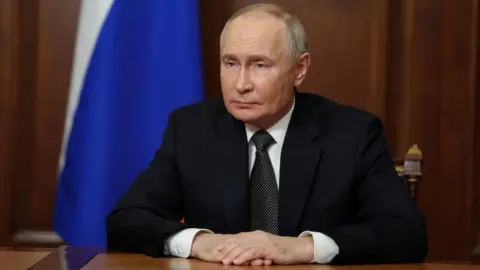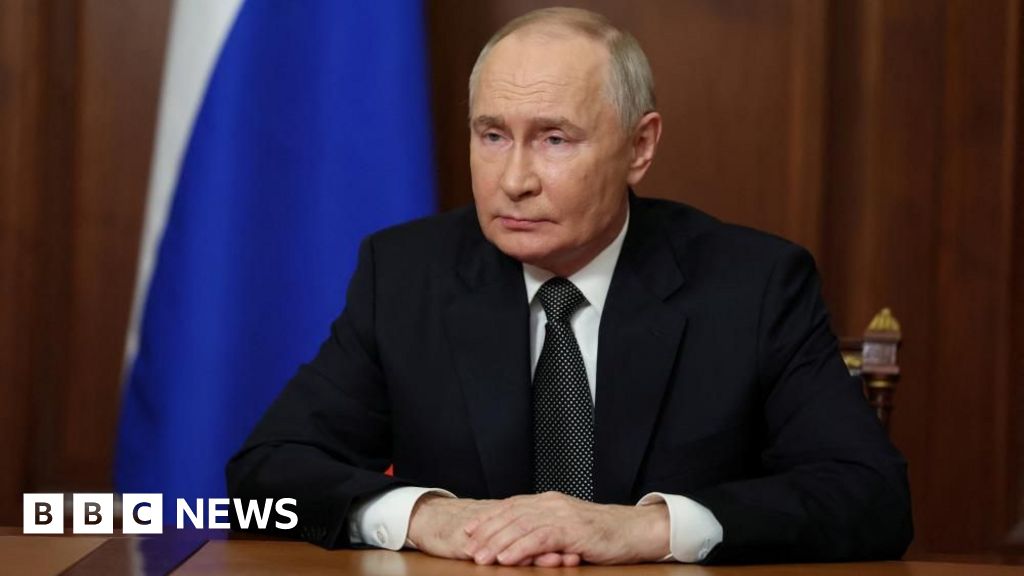 Reuters
Reuters“What will President Vladimir Putin do next?”
These are the questions I was asked most often this week.
Of course it is.
After all, this was the week in which Kremlin leaders lowered the threshold for Russia to use nuclear weapons.
This was the week the US and UK crossed (another) Putin’s red line and allowed Ukraine to fire Western-supplied long-range missiles at Russia.
This was also the week in which Putin effectively threatened Britain, the United States, and other countries that supply Ukraine with such weapons and such purposes.
“We believe that we have the right to use our weapons against military installations of countries that allow the use of weapons against our installations,” the Russian leader said in an address to the nation on Thursday evening. mentioned in.
So you know, “What will Vladimir Putin do next?” is the most pressing question. And since I’m the BBC’s Russia editor, you might expect me to have the answer.
I will be honest with you. I don’t.
Perhaps even President Putin does not know the answer, which makes the situation even more serious.
Instead of answers, some observations.
accept escalation
The Kremlin this week blamed “Western powers” for escalating the war in Ukraine.
But the nearly three-year war in Ukraine has shown that Vladimir Putin is the one who accepts escalation as a means to achieving his own goals, in this case control of Ukraine, or at least peace on Russia’s terms. It shows.
President Putin’s full-scale invasion of Ukraine, decision to declare four Ukrainian territories part of Russia, deployment of North Korean troops to the Kursk region, and Thursday’s targeting of the Ukrainian city of Dnipro with a new intermediate-range hypersonic ballistic missile The decision to do so, followed by the threat to attack the West – all represent a moment of escalation in this conflict.
I once described Vladimir Putin as a car with no reverse gear or brakes, driving down the highway with the gas pedal stuck to the floor.
As far as I can see, not much has changed.
Don’t expect the Putinmobile to suddenly slow down or relax in the face of a long-range missile attack on Russia.
However, escalation is another issue. That’s a distinct possibility.
Ukraine will brace for further attacks and even heavy bombing by Russia.
Western governments will assess the level of threat in light of President Putin’s warning.
Even before the Kremlin leader’s televised speech, there were concerns in the West about the escalation of a hybrid Russia war.
Last month, the head of MI5 warned that Russian military intelligence was engaged in an operation to “cause mayhem on the streets of Britain and Europe”.
“We’ve seen things like arson and sabotage,” he added.
Back in June, President Putin suggested that Russia could arm its Western adversaries if Ukraine was allowed to strike deep into Russia with long-range Western missiles.
“If someone thinks that it is possible to supply such weapons to a war zone and attack our territory and cause problems for our country, then why should we supply the same class of weapons to neighboring regions? “We believe that we can’t supply that,” he said. Will sensitive facilities in countries committing such acts against Russia be targeted around the world? ”
Russia attacks Ukraine with new missile, Putin warns West
nuclear option
The question “What will President Putin do next?” It is usually followed by “Will Putin use nuclear weapons in the Ukraine war?”
The Russian president dropped some subtle hints.
In announcing the launch of a “special military operation” – a full-scale invasion of Ukraine – he warned against “those who are tempted to intervene from outside.”
“No matter who stands in our way, no matter who poses a threat to our country and people,” the Kremlin leader declared.
“And the results will be like nothing you’ve ever seen in history.”
Western leaders generally ignored what they saw as the rattling of nuclear sabers. Since the war began, Western governments have crossed several “red lines” in Russia. It provided Ukraine with tanks, state-of-the-art missile systems, and F-16 fighter jets.
The “results” threatened by the Kremlin never materialized.
In September, President Putin announced that he would lower the standards for the use of nuclear weapons, and the executive order was released this week. It issued a clear warning to Europe and the United States not to authorize long-range missile attacks on Russian territory.
We have now crossed this red line. In his address to the nation, President Putin confirmed Western reports that Ukraine had fired a U.S.-supplied Atakum missile and a British-made Stormshadow missile at targets inside Russia.
When the pro-Kremlin tabloid Moskovsky Komsomolets asked the retired lieutenant general earlier this week how Russia should respond to the Atakums attack on the Bryansk region, he replied:
“It would probably be short-sighted to start World War III because of the attack on the arsenal in the Bryansk region.”
It would be comforting to think that the Kremlin also shares that view.
But President Vladimir Putin’s address to the nation contained no evidence of that.
His message to Ukraine’s supporters in the West was: “This is a line that I am seriously considering and must not cross. I hope you will dare to cross it.”
“Even President Putin does not know whether he can use nuclear weapons or not. It depends on his feelings,” Novaya Gazeta columnist Andrei Kolesnikov told me recently.
“We know he’s a very emotional man. The decision to start this war was also an emotional step. So we know that he’s a very emotional man. The idea must be taken seriously. They say the fear of war should return and contain both sides, but this is also a means of escalation.
“This interpretation would have to acknowledge that, depending on the situation, Putin could use at least tactical nuclear weapons in the framework of a limited nuclear war. It would not solve the problem. But it would be the beginning of a suicidal escalation for the whole world. It will be.”
Tactical nuclear weapons are small warheads intended for battlefield use or limited attack.
trump factor
President Vladimir Putin may act on emotion. He is also clearly driven by resentment towards the West and seems determined not to back down.
But he also knows that the world could soon be a very different place.
In two months, Joe Biden will leave office and Donald Trump will take the White House.
President-elect Trump has expressed skepticism about U.S. military aid to Ukraine and has fiercely criticized NATO.
He also recently said it would be “smart” to talk to President Vladimir Putin.
All of that should be music to Putin’s ears.
This means that despite the latest threats and warnings, the Kremlin may decide not to make a major escalation at this time.
That is if the Kremlin calculates that Donald Trump will help end the war on favorable terms for Russia.
If that calculus changes, Moscow’s response could change as well.




